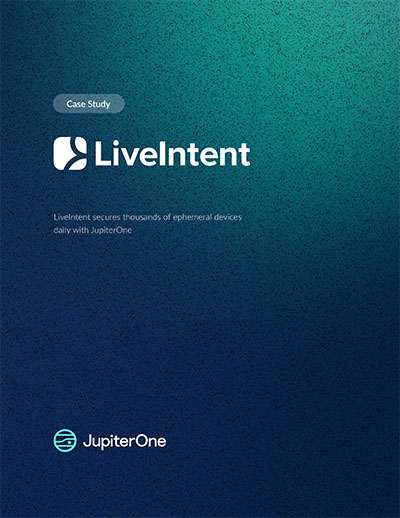
LiveIntent secures thousands of ephemeral devices daily with JupiterOne
Challenges
- Lacked a solution that could scale with them and secure highly dynamic, multi-account AWS environments.
- Could not get centralized, comprehensive visibility into thousands of ephemeral devices.
- Struggled with time-intensive, manual processes for managing incident responses and audits
- Inability to streamline and prioritize day-to-day SecOps activities.
Results
- Built custom queries and automated evidence collection for audits
- Created a centralized, up-to-date asset inventory complete with details about the relationships they have with each other
- Implemented automated query-based alerts for accelerated incident response
- Bolstered AWS security with JupiterOne’s 40+ AWS integrations
Meet Sean Cooper, VP of Information Security at LiveIntent
Sean Cooper joined LiveIntent three years ago to help build out their security program. As the company grew, and the security challenges evolved, Sean found that the security team needed better visibility into their environment and a better process for managing incident responses, audits, and day-to-day security operations.
The security team at LiveIntent discovered JupiterOne over a year ago and uses it daily to find data and insights about their environment that, according to Sean, “they would have a hard time finding otherwise.”
CHALLENGES
Securing thousands of ephemeral devices
LiveIntent has a highly dynamic workload within AWS. Every day, a couple thousand of AWS’ large and expensive machines spin up for less than 12 hours, “do their thing,” and then go away. All of them have to be governed, managed, and evaluated to ensure they’re performing as intended and not introducing unexpected security risks.
Because of how AWS presents information across multiple accounts, and some other limited functionality of the native user interface in AWS, Sean and his team were having trouble finding the information they needed to manage all of their machines in AWS. They started looking for a product that could amalgamate all of their accounts into one place for better visibility and control.
Project-based vs. Responsive security
LiveIntent, along with many information security teams, have two main buckets for security work: project-based and responsive.
Project-based security is centered around large projects like new security capabilities, yearly audits, and customer security information requests. These generally occur with some regularity and can be planned for.
Responsive security, or operational security, focuses more on the issues that crop up, seemingly unceasingly, throughout the work week. A large part of this responsive work is triaging and evaluating alerts.
Let’s take a look at both types of work from the LiveIntent perspective.
SOLUTIONS
Project-based security
Compiling information for audits, IRLs, and customer security requests with thousands of questions
SOC2 Audit
Anyone who’s been through a formal audit knows they can involve a lot of manual, time-consuming work gathering information and evidence and building out the proper frameworks and reporting.
LiveIntent recently completed their SOC2 audit. They were able to leverage the JupiterOne platform for evidence collection and correlation with the pre-built SOC2 framework. With all of their cyber asset information in one place, they were able to build queries, answer in-depth questions, and save those queries and answers as evidence.
Since dealing with information request lists (IRLs) can be a challenge, Sean and his team are working on creating roughly fifty IRLs that they can automate to avoid manually filtering through spreadsheets. Sean joked that the DevOps team is “salivating” at the thought of not having to do another audit and IRL manually.
LiveIntent is working with JupiterOne to move towards a fully automated SOC2 Audit experience in the future. Their goal for future audits is to progressively automate evidence collection and continuously perform control evaluation. They are building out queries and saving the information they will need to streamline the audit process for the next time around.
Customer security requests
LiveIntent has a highly dynamic workload within AWS. Every day, a couple thousand of AWS’ large and expensive machines spin up for less than 12 hours, “do their thing,” and then go away. All of them have to be governed, managed, and evaluated to ensure they’re performing as intended and not introducing unexpected security risks.
Because of how AWS presents information across multiple accounts, and some other limited functionality of the native user interface in AWS, Sean and his team were having trouble finding the information they needed to manage all of their machines in AWS. They started looking for a product that could amalgamate all of their accounts into one place for better visibility and control.
Key Integrations










SOLUTIONS
Responsive security
Improving Incident Response when native tools just don’t do the trick
LiveIntent was having difficulty doing IR investigations in AWS because of a painfully slow and manual process, compounded by the inadequacy of the AWS UI. They needed a better solution to triage and respond to security events.
Incident Response (IR) includes triaging alerts and conducting investigative research to find what is connected to what, and who, etc. The goal of all of this digging is to qualify or disqualify an event as a security incident. If it is qualified as a potential security incident, the LiveIntent team needs to identify the root cause and find a solution.
An up-to-date asset inventory is key to this process. Without a complete cyber asset inventory, and a simple way to access or query that inventory, it can be difficult to track down potential incidents. Since cyber assets encompass many types of resources, the LiveIntent team uses JupiterOne to collect and analyze data from every single “thing” in their technology stack and digital operations, including cloud service providers, HR systems, code repos, firewall rules, user endpoints, SaaS apps, IAM policies, security controls, vulnerability findings, and more. By aggregating all of this data, LiveIntent gets a holistic, centralized view of their cyber assets, including the relationships that they have with one another, all of which they can’t get anywhere else.
The information security team at LiveIntent is alerted anytime something doesn’t look right. Before finding JupiterOne, they were trying to evaluate their own reference materials and looking internally at AWS to find connection points and track down alerts. They were attempting to use the native AWS console and UI to find the root cause of security incidents.
Because of the volume of ephemeral devices they use (remember the thousands of machines that spin up and down every day and are active for less than 12 hours at a time?), navigating between different AWS accounts was quite cumbersome. According to Ken, “There is no one single view [in AWS] to see detailed information from all of your accounts. JupiterOne gathers all of this information together in one place so we can find what we need, rather than having 50 tabs open and trying to keep track of them.”
The LiveIntent team needed a way to easily ask questions of their technology stack and cyber asset data. They couldn’t query natively in AWS, and were impressed when they first saw the JupiterOne Query Language (J1QL). They have since become power users of J1QL, and often spend time digging into advanced queries with the JupiterOne customer success team, testing the limits of what asset data they can find with one single query.
RESULTS
Uncovering more use cases for JupiterOne
We often say that creating a complete, accurate cyber asset inventory helps build the foundation for security operations. Once LiveIntent had full visibility into their environment and one central place to search their asset inventory, they were able to discover and add other functionality in JupiterOne, including compliance, policy mappings, and new queries for deeper incident response investigations. Some of the capabilities they have gained since using the JupiterOne platform include:
Enforcing policies
Sean and his team found the policies module and quickly started the process of building out all policies in JupiterOne.
Automating evidence collection
They are continuing to build new queries to automate evidence collection and future audit IRLs.
Simplifying Vendor management
LiveIntent is looking at streamlining their vendor management process in JupiterOne, replacing spreadsheets and Google forms for data collection.
Bolstering AWS security
Sean, Ken, and Adam want to take advantage of JupiterOne’s 40+ AWS service integrations, starting with native AWS security tools like AWS GuardDuty, AWS Security Hub, and AWS Config. There is potential for the team to replace other security tools in their tech stack, eliminating costs, and leveraging the combined functionality from AWS with the power and clarity they get from JupiterOne.
When customer input meets our desire to never stop improving
JupiterOne is committed to continually improving our platform. We’re constantly releasing new updates, adding integrations, and making more robust queries in a never ending quest to improve the user experience. We value input from our customers in this process. Our goal is to help them improve processes and workflows, as well as gather feedback on the platform to make it better.
The team at LiveIntent have been engaged with us from the start. Sean commented that “it’s a bidirectional process. We meet on a regular basis with the JupiterOne Customer Success team to discuss queries, create new ones, and improve both the workflow and automation for LiveIntent, as well as bolster the JupiterOne Query Library and improve our overall product experience. If you’re willing to work with us, we don’t mind putting in the effort to get it working specifically for our processes. We saw the value right off the bat [from JupiterOne], and realized we could expand our usage as we grew.”
Conclusion
LiveIntent, like many other companies moving to the cloud, had a highly dynamic workload that was becoming unwieldy. They needed to amalgamate all of their cybersecurity asset and relationship data into one central repository. This complete cyber asset inventory became their foundation for incident response, day-to-day security operations, compliance automation, policy control, and a host of other security activities.
Whether you have a highly dynamic workload in AWS, GCP, Azure, or Alibaba Cloud, or simply can’t find what you’re looking for in the native consoles, JupiterOne can help. Contact JupiterOne today to schedule a demo and learn more.
Keep Reading

Learn how Okta has turned security into a business enabler by bringing secure-by-design products to market quickly.

Mercury Financial established complete cyber asset visibility across 130 integrations within one week.

With JupiterOne, Indeed gained a holistic view of all its asset relationships and attack surface alongside a broad cloud migration.




